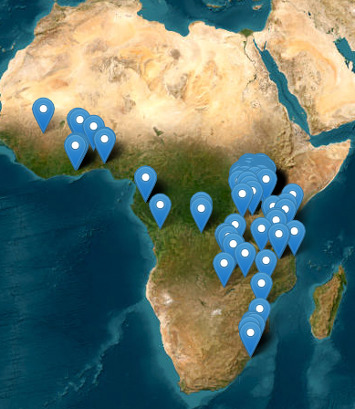The MalariaGEN Vector Observatory Anopheles funestus data resource version 1.1 (Af1.1) contains single nucleotide polymorphism (SNP) calls, copy number variant (CNV) calls and SNP haplotypes from whole-genome sequencing of Anopheles funestus mosquitoes collected in Benin (1 sample), Democratic Republic of Congo (55 samples), Gabon (50 samples), Ghana (12 samples), Kenya (30 samples), Malawi (31 samples), Mali (1 samples), Mozambique (7 samples), Nigeria (263 samples), South Africa (20 samples), Tanzania (77 samples), Uganda (1163 samples), and Zambia (355 samples).
Data sets
Af1.1 Contributing Studies
1236 – Anopheles funestus vector surveillance in Tanzania
1288 – LLIN Evaluation in Uganda Project (LLINEUP)
1315 – ANOSPP screening of Anopheles species and Plasmodium presence in malaria vectors in Nigeria
1326 – ANOSPP screening of Anopheles species and Plasmodium presence in malaria vectors in Uganda
Af1.1 Terms of Use
Data from this project will be made publicly available before journal publication. Unless otherwise stated, analyses of project data are ongoing and publications are in preparation by project partners, and it is not permitted to use project data for publication (including any type of communication with the general public) without prior permission from the originating partner studies.
Although malaria is generally an endemic rather than an epidemic disease, and the focus of this project is on surveillance of disease vectors rather than pathogens, our data terms of use build on MalariaGEN’s approach to data sharing, and adopt norms which have been established for rapid sharing of pathogen genomic data during disease outbreaks. The primary rationale for this approach is that malaria remains a public health emergency, where ethically appropriate and rapid sharing of genomic surveillance data can help to detect and respond to biological threats such as new forms of insecticide resistance, and to adapt malaria vector control strategies to different settings and changing circumstances.
If you have any questions regarding these terms of use, please contact support@malariagen.net.
Af1.1 Data Access
Please visit the release page on the vector data guide to find out more about how to access the data.
Af1.1 Sample Locations
Mosquitoes were collected from across 13 countries – Benin, Democratic Republic of Congo, Gabon, Ghana, Kenya, Malawi, Mali, Mozambique, Nigeria, South Africa, Tanzania, Uganda, and Zambia.

